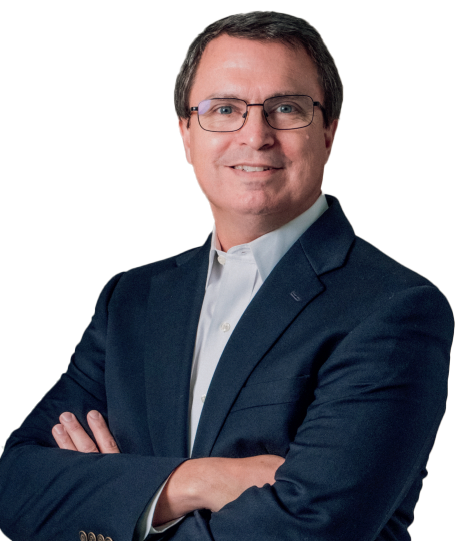You're an Innovator. Your Attorney Should Be One Too.
U.S. Patent Application Preparation & Prosecution
Reliable Legal Guidance
I care about people and their success. Because many inventors have no previous experience with the US patent system, they need someone to guide them through the process and explain the reasoning behind each procedure and the considerations for each decision.
Genuine Dedication
I'm naturally curious about each invention and motivated to find the best way to describe them and their embodiments. These qualities keep me focused on the patent application until it meets the requirements set by the US Patent and Trademark Office.
Valuable Experience
There are a lot of rules to be followed when preparing a patent application and throughout each procedural stage of prosecuting a patent application. My 30 years as a registered patent attorney allow me to help my clients avoid delays and costly mistakes.
Houston, Texas
Patent Attorney
Jeff Streets
Attorney at Law
Before becoming an attorney, I worked as an engineer at Dow Chemical for four years. That's when I became captivated by the concept of protecting your investment in research and development by obtaining patents. So I returned to law school, passed the Texas bar, and then passed the US Patent Office registration exam to become a registered patent attorney. For the past 30 years, I've been leading people through the patent application process. Offering a combination of legal and technical skills, I serve inventors across the United States. And my work doesn't stop at filing patent applications. It extends to handling the prosecution of those patent applications, filing related patent applications, and more.
Learn How Patents Can Protect Your Inventions
I believe that every patent application should be prepared in a manner that gives the invention every opportunity to be granted a patent. I also understand that your innovation is more than just an idea—it's the catalyst for your success. While a patent agent can assist you in filing and prosecuting patent applications, a patent attorney has legal training and can provide legal advice. I can provide legal counsel on a range of issues, such as patentability, patent infringement, trade secrets, trademarks, copyrights and confidentiality agreements. Contact my Houston firm today to schedule a meeting and learn more.
Patent Success Story
A parent of a high school theater student asked whether I would speak with the Theater Technology teacher about patenting a device that the teacher had invented for making backdrops for theater productions, such as musicals. The device is referred to as a paint frame. Of course, paint frames are generally well-known devices. However, the paint frame invented by the Theater Technology teacher was unique in its modularity and lightweight, yet rigid, construction. Working closely with the teacher/inventor, we developed a complete technical disclosure of the modular paint frame and a detailed description of how to make and use the paint frame.
The detailed description supported patent claims directed to the paint frame itself in an assembled configuration and to a kit of components that a third party could use to assemble a paint frame on-site in a theater. The emphasis on claims directed to a kit of components reflected the reality that these paint frames are so large that no competitor would ever sell one in an assembled configuration, but rather would sell a kit of components along with a set of instructions for assembling the paint frame.
Working with the Patent Examiner assigned to the patent application, it was determined that the paint frame was patentable due to the way the paint frame components could be assembled and used in cooperation with a wire rope for suspending, raising, and lowering the paint frame toward the back of the stage. This was viewed as an essential feature for a paint frame used in a theater production and distinguished the paint frame from prior art paint frames.
Title or Question
Describe the item or answer the question so that site visitors who are interested get more information. You can emphasize this text with bullets, italics or bold, and add links.Title or Question
Describe the item or answer the question so that site visitors who are interested get more information. You can emphasize this text with bullets, italics or bold, and add links.Title or Question
Describe the item or answer the question so that site visitors who are interested get more information. You can emphasize this text with bullets, italics or bold, and add links.Title or Question
Describe the item or answer the question so that site visitors who are interested get more information. You can emphasize this text with bullets, italics or bold, and add links.Title or Question
Describe the item or answer the question so that site visitors who are interested get more information. You can emphasize this text with bullets, italics or bold, and add links.Title or Question
Describe the item or answer the question so that site visitors who are interested get more information. You can emphasize this text with bullets, italics or bold, and add links.
Frequently Asked Questions
Patent FAQ
Who can file a US patent application?
Any person or group of persons, regardless of citizenship or residence, who are the true inventors of patent eligible subject matter may apply for a US patent application. Alternatively, a corporation to which the inventors will assign their rights in the invention may also apply for a US patent application.
When should you file a US patent application?
As soon as the invention has been conceived and can be described in such detail to enable a person of ordinary skill in the art to make and use the invention. There is no obligation to make a prototype, perform a prior art search, or make a patentability determination. The US awards patents to the first inventor to file a patent application directed to the invention, so there is an incentive to file your patent application as soon as you can.
How long is the term of a patent?
A utility patent is generally valid for a term of 20 years from the filing date or earliest priority date, subject to possible patent term extension, so long as each of three maintenance fees are paid during the life of the patent. A design patent is valid for a term of 15 years from the date that the patent is granted. A plant patent is valid for a term of 20 years from the filing date or earliest priority date. There are no maintenance fees required for a design patent or a plant patent.
Where can I enforce a US patent?
A patent can only be enforced in the territory that granted the patent. So a US patent is generally only enforceable in the United States. However, according to US patent laws, whoever without authority makes, uses, offers to sell, or sells any patented invention, within the United States, or imports into the United States any patented invention during the term of the patent therefore, infringes the patent.
How much does it cost to obtain a patent?
The total cost depends upon the complexity of the invention, whether the invention/applicant has prepared a full invention disclosure with drawings, whether the invention involves subject matter that could be considered an abstract idea, the scope and content of the prior art cited against the patent application, the quality of examination provided by the examiner, and whether additional procedures such as an appeal become necessary. We are open to quoting a fixed cost for preparing and filing a patent application, but the amount of work involved in prosecuting the application is unpredictable and the cost can only be determined one step at a time.
Testimonials
I highly recommend Jeff Streets as a patent attorney. He was impeccably honest, diligent, hard working but most importantly got my patent for me. He guided me through the whole process and his recommendations were spot on. I feel like he worked with me and for me which is hard to find in a lawyer. You are in good hands with Jeff.
-Lucio D'lsep
Questions About Patents?
Blog



Patent Attorney Serving Clients Nationwide
In a world where intellectual property rights are increasingly critical, protecting your inventions, designs, and discoveries is paramount. I understand that patent prosecution is a unique and complex process, so I am very responsive to questions from my clients at any stage.
If you're working on further developing an invention or commercializing a product based on it, then there are additional options and considerations that you should be aware of such as filing continuation-in-part applications to cover new embodiments of the invention. No matter your situation or location, I can help. Contact me at Streets Law Firm in Cypress, Texas, to set up a time to talk. I serve clients throughout Houston and the United States.
Contact Me
We will get back to you as soon as possible.
Please try again later.
Contact Me
Get the conversation started. Fill out this form or call my office to schedule a meeting. I'm located in Texas, but work with clients across the country.




